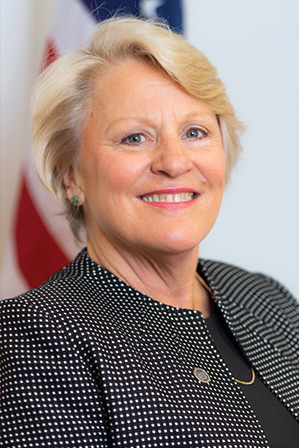A Bipartisan Solution for State: The Case for a 10 Percent Cap
President’s Views
BY BARBARA STEPHENSON

When discussing the role of the Foreign Service, I often turn to the soaring words of our founding legislation. The Foreign Service Act of 1980 (the current iteration of the 1924 law creating the U.S. Foreign Service) says the “career foreign service, characterized by excellence and professionalism, is essential in the national interest to assist the President and the Secretary of State in conducting the foreign affairs of the United States.”
I then add a reminder that we, the career Foreign Service, must operate above the partisan fray, always with an eye toward our country’s long-term national security interests.
In this, my next to last column as AFSA president, I return to first principles, to founding documents, to explore again the purpose of the Foreign Service, with the aim of making sure we collectively act as stewards of our beloved institution, keeping it strong and pointed north as we fulfill our vital role.
Throughout my presidency, I have sought to model this behavior, to avoid being drawn into divisive, sometimes partisan, debates and instead to identify common ground where a bipartisan majority can stand together in defense of America’s global leadership.
As attention has focused on the extraordinary number of high-level vacancies at State and the large number of American embassies with no ambassador, I have been asked to comment on where the fault lies. Is it the administration (for nominating unqualified candidates) or the Senate (for foot-dragging on confirmations) that is responsible for leaving American diplomacy diminished?
When I recently had the honor of speaking to a score of senators about the state of State, I was asked again. It’s a serious problem, I answered.
As senators, I told them, you very reasonably want a steady pipeline of highly qualified nominees coming before you for approval. While the power to nominate rests with the administration, there is a legislative fix Congress could make that would address this issue in a structural and lasting way.
Section 304(2) of the Foreign Service Act of 1980 currently states: “Positions as chief of mission should normally be accorded to career members of the Service, though circumstances will warrant appointments from time to time of qualified individuals who are not career members of the Service.”
I told the senators that AFSA proposes replacing “from time to time” with “not to exceed 10 percent of all ambassadorial appointments,” noting that this recommendation was put forth in the 2015 American Academy of Diplomacy report, American Diplomacy at Risk.
I referred lawmakers to the conclusions I cite in my May column, namely: “The United States is an extreme outlier in the number of political appointees who serve as ambassadors and senior leaders in the State Department.”
I asked them to reflect on the ambassadors sent to Washington by the United Kingdom, France, Russia—all are experienced career diplomats playing at the top of their games.
I noted that State has more political appointees than the vastly larger Department of Defense, more than any other cabinet department—which may well explain why it can be a struggle to operate above the partisan fray.
Did I expect this idea to immediately take flight and win approval? I did not. I hoped to start a conversation about the impact on American diplomacy of having such an extraordinary number of political appointees. That conversation has begun. And as I prepare to move on to my next assignment as deputy chief of mission in Baghdad, I ask you to carry it forward.
We must become articulate advocates for structural reforms that bring the operation of American diplomacy into line with established best practice around the world. Reducing the percentage of high-level positions filled by political appointees will help ensure that the Foreign Service can operate above the partisan fray—and always in the national interest.

